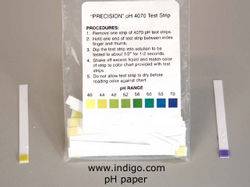Knowing the ph of your soil is important. You will need at least ph test strips from the petstore in the aquarium section or from brew your own beer/wine stores. Strips with a range of 4 to 7 ph should do. I highly suggest getting a regular ph meter that can be callibrated and can test the ph of liquids. Avoid probe type you just stick in the soil.Modern plant production is a science, not an art. However, growers can’t afford to run their business as an experiment. Good scientists, and good growers, rely on constant measurement to assure the desired result of their efforts. Testing won’t wait until symptoms develop; it must begin before planting and continue throughout the crop. Analysis helps not only to solve problems, but to prevent them from happening.


One way to test the soil ph is by carefully taking the plant out of the pot. About halfway down on the rootball, scrape 1/4 cup soil (60ml) off the roots. Place the soil in a container. Add 1/4 cup (60ml) of distilled water. Stir well. Allow to sit 15 to 30 minutes. Test the ph of this slurry. Note: it is best to test soil ph with this method using the same moisture level in the soil everytime. The ph is influenced by how wet the soil is before adding the distilled water.
Another way to test soil ph is by using the pour through method. This doesn't require removing any soil from the pot and makes this more convenient. After you have fertilized/watered and the soil is completely wet, wait 30 minutes. Then apply a few ounces (50-100 ml) of distilled water to the top of the pot till there is a slight runoff. Catch this runoff coming out of the drain holes maybe on a saucer. Test this ph.
Pour through method of adding distilled water and catching the runoff.

Soilless mixes that include peatmoss, perlite, vermiculite, pinebark, etc.. ph should be between 5.6 to 6.2. For a soil grow rather than soilless, ph should be about 6 to 6.5.
Adjusting your fertilizer water after mixing is important. The fertilizer water should be adjusted to about 5.8 to 6 ph (after mixing) when applied to a soilless mix. You would choose a higher ph for soil grows. Your ph, if not good, will gradually rise or lower to this better ph. This will also maintain the proper ph. You can use these to adjust the ph:
How to make your own "ph up" and "ph down"
Electrical conductivity (ec) can give you an idea of the fertilizer salts in the media. Too high or low. To test, take 1 part soil (1/4cup or 60ml)) and mix with 2 parts distilled water or just add water to your 1:1 ph testing you might have done above so its 2 parts water to 1 part soil. Mix well. Allow to sit 15 to 30 minutes. Filter the mixture to get the liquid using a coffee filter. Ec is measured in mmhos/cm or ds/m. For established plants it should be .8 to 1.2 and for seedlings .5 to .9 To convert this to ppm, you can estimate to multiply by about 700. (?)
Soluble salts levels by the 1:2 dilution method and associated interpretation.
EC (dS/m) y Interpretation
0-0.25
Very low - indicates probable deficiency.
0.25-0.75
Suitable for seedlings and salt-sensitive plants.
0.75-1.25
Desirable level for most plants.
1.75-2.25
Reduced growth, leaf marginal burn.
The pour through method of adding a slight amount distilled water to your pots already wet media and catching a slight runoff can also be used to test ec but is less accurate. The only value I have is by grower observation .5 to 2.5 ds/m with above 2 not really good.
Suggested values for pour-through or leachate test.
Rating EC reading micromhos (?)
Low 0-422
Acceptable 423-1136
Optimum 1137-2018
High 2019-2984
Very High 2895 and above
The pour through ec test is not well documented yet. This may require experimentation and good observation to know what level works best for you.
Good luck growing!

Pour through method reference: http://www.ces.ncsu.edu/depts/hort/hil/hil-401.html
Last edited:



